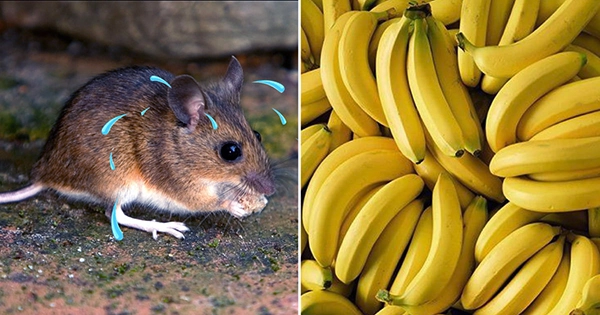Researchers discovered that male mice are afraid of the scent of bananas when researching the reactions of male mice to pregnant and breastfeeding female mice. Male mice’s stress hormone reactions spiked when they were around late-pregnant female mice, according to a study from McGill University in Montreal, Quebec. “Male mice demonstrate tension and stress-induced [pain inhibition] in the presence of late-pregnant or nursing female mice,” the researchers write in their Science Advances paper. “As has been seen previously, late-pregnant and breastfeeding female mice respond to gonadally intact stranger male mice with hostility and urine marking in our own hands.”
To defend their own DNA, male mice are known to be aggressive and infanticidal toward pups. Chemicals are emitted by very pregnant and nursing mice, as well as vigorously guarding their offspring, to keep these guys away. Professor Jeffrey Mogil, the study’s principal author, told Live Science, “Rodents and a lot of animals other than humans are depending on their smell senses.” “Urine scent-marking is well-known, but we’ve discovered a new message in animals that has never been documented before.”
“We’ve observed a lot of olfactory communications conveyed from men to females, but there are fewer cases of females transmitting olfactory messages to males.” The majority of these messages are about sexual activity, but in this situation, sex has no bearing. The females are telling the males to keep away, because if you touch my babies, I’ll beat the snot out of you.” So, how do bananas fit into all of this? Is it possible that they, too, are sending out a warning to male mice? Yes, by chance, but not for the purpose of defending their own mouse babies.
The substance n-pentyl acetate, which is prevalent in female mice’s urine, particularly during later pregnancy and lactation, was one of the compounds that had the greatest impact on male mice’s hormone alterations, according to the researchers. “n-Pentyl acetate is extremely similar in chemical structure to isoamyl (or isopentyl) acetate, and both are present in a number of fruits and utilized to generate banana oil/extract,” the team writes in the report.
The researchers bought banana oil extract from the grocer and put it in the cages of male mice to see how their stress levels changed in response. The stress reaction in mice, according to the researchers, is identical to the stress response in humans when they are going to fight. “While maternal aggression does not always succeed in preventing male intruders from committing infanticide, any threat of violence is likely to cause stress in both parties, and maternal aggression has been shown to directly produce stress-induced [pain inhibition] in males measured after the attacks,” the researchers wrote in their study.
“What we show here is that even in the absence of genuine maternal violence, stress-induced [pain inhibition] in male mice may be detected; the mere fear of such aggressiveness is adequate, and this threat is transmitted via volatile urine chemicals.” The presence of n-pentyl acetate, whether in banana or mouse urine form, caused increased stress in virgin male mice, according to the study. This explains why they are more aggressive toward newborns than non-virgin mice, implying that they represent a greater threat to infants than older males. The researchers stated, “The current data show that close proximity of male subjects to reproductively active females is a hitherto undiscovered stressor for the males, and that stress may even be generated by the presence of particular meals.”















